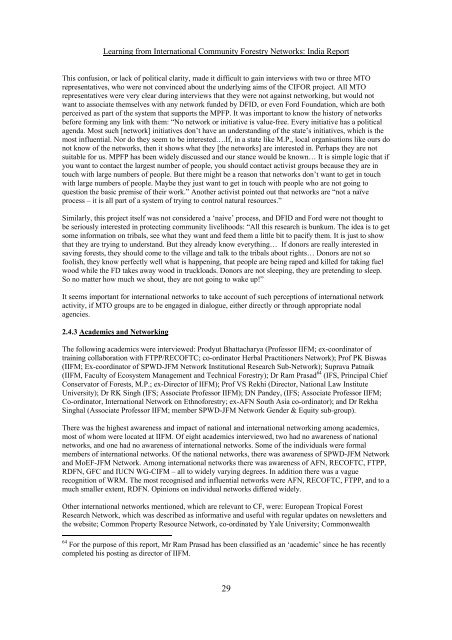Snapshots of International Community Forestry Networks: Country ...
Snapshots of International Community Forestry Networks: Country ...
Snapshots of International Community Forestry Networks: Country ...
Create successful ePaper yourself
Turn your PDF publications into a flip-book with our unique Google optimized e-Paper software.
Learning from <strong>International</strong> <strong>Community</strong> <strong>Forestry</strong> <strong>Networks</strong>: India Report<br />
This confusion, or lack <strong>of</strong> political clarity, made it difficult to gain interviews with two or three MTO<br />
representatives, who were not convinced about the underlying aims <strong>of</strong> the CIFOR project. All MTO<br />
representatives were very clear during interviews that they were not against networking, but would not<br />
want to associate themselves with any network funded by DFID, or even Ford Foundation, which are both<br />
perceived as part <strong>of</strong> the system that supports the MPFP. It was important to know the history <strong>of</strong> networks<br />
before forming any link with them: “No network or initiative is value-free. Every initiative has a political<br />
agenda. Most such [network] initiatives don’t have an understanding <strong>of</strong> the state’s initiatives, which is the<br />
most influential. Nor do they seem to be interested….If, in a state like M.P., local organisations like ours do<br />
not know <strong>of</strong> the networks, then it shows what they [the networks] are interested in. Perhaps they are not<br />
suitable for us. MPFP has been widely discussed and our stance would be known… It is simple logic that if<br />
you want to contact the largest number <strong>of</strong> people, you should contact activist groups because they are in<br />
touch with large numbers <strong>of</strong> people. But there might be a reason that networks don’t want to get in touch<br />
with large numbers <strong>of</strong> people. Maybe they just want to get in touch with people who are not going to<br />
question the basic premise <strong>of</strong> their work.” Another activist pointed out that networks are “not a naïve<br />
process – it is all part <strong>of</strong> a system <strong>of</strong> trying to control natural resources.”<br />
Similarly, this project itself was not considered a ‘naive’ process, and DFID and Ford were not thought to<br />
be seriously interested in protecting community livelihoods: “All this research is bunkum. The idea is to get<br />
some information on tribals, see what they want and feed them a little bit to pacify them. It is just to show<br />
that they are trying to understand. But they already know everything… If donors are really interested in<br />
saving forests, they should come to the village and talk to the tribals about rights… Donors are not so<br />
foolish, they know perfectly well what is happening, that people are being raped and killed for taking fuel<br />
wood while the FD takes away wood in truckloads. Donors are not sleeping, they are pretending to sleep.<br />
So no matter how much we shout, they are not going to wake up!”<br />
It seems important for international networks to take account <strong>of</strong> such perceptions <strong>of</strong> international network<br />
activity, if MTO groups are to be engaged in dialogue, either directly or through appropriate nodal<br />
agencies.<br />
2.4.3 Academics and Networking<br />
The following academics were interviewed: Prodyut Bhattacharya (Pr<strong>of</strong>essor IIFM; ex-coordinator <strong>of</strong><br />
training collaboration with FTPP/RECOFTC; co-ordinator Herbal Practitioners Network); Pr<strong>of</strong> PK Biswas<br />
(IIFM; Ex-coordinator <strong>of</strong> SPWD-JFM Network Institutional Research Sub-Network); Suprava Patnaik<br />
(IIFM, Faculty <strong>of</strong> Ecosystem Management and Technical <strong>Forestry</strong>); Dr Ram Prasad 64 (IFS, Principal Chief<br />
Conservator <strong>of</strong> Forests, M.P.; ex-Director <strong>of</strong> IIFM); Pr<strong>of</strong> VS Rekhi (Director, National Law Institute<br />
University); Dr RK Singh (IFS; Associate Pr<strong>of</strong>essor IIFM); DN Pandey, (IFS; Associate Pr<strong>of</strong>essor IIFM;<br />
Co-ordinator, <strong>International</strong> Network on Ethn<strong>of</strong>orestry; ex-AFN South Asia co-ordinator); and Dr Rekha<br />
Singhal (Associate Pr<strong>of</strong>essor IIFM; member SPWD-JFM Network Gender & Equity sub-group).<br />
There was the highest awareness and impact <strong>of</strong> national and international networking among academics,<br />
most <strong>of</strong> whom were located at IIFM. Of eight academics interviewed, two had no awareness <strong>of</strong> national<br />
networks, and one had no awareness <strong>of</strong> international networks. Some <strong>of</strong> the individuals were formal<br />
members <strong>of</strong> international networks. Of the national networks, there was awareness <strong>of</strong> SPWD-JFM Network<br />
and MoEF-JFM Network. Among international networks there was awareness <strong>of</strong> AFN, RECOFTC, FTPP,<br />
RDFN, GFC and IUCN WG-CIFM – all to widely varying degrees. In addition there was a vague<br />
recognition <strong>of</strong> WRM. The most recognised and influential networks were AFN, RECOFTC, FTPP, and to a<br />
much smaller extent, RDFN. Opinions on individual networks differed widely.<br />
Other international networks mentioned, which are relevant to CF, were: European Tropical Forest<br />
Research Network, which was described as informative and useful with regular updates on newsletters and<br />
the website; Common Property Resource Network, co-ordinated by Yale University; Commonwealth<br />
64 For the purpose <strong>of</strong> this report, Mr Ram Prasad has been classified as an ‘academic’ since he has recently<br />
completed his posting as director <strong>of</strong> IIFM.<br />
29

















![CynefinFramework final [Read-Only]](https://img.yumpu.com/19017304/1/190x135/cynefinframework-final-read-only.jpg?quality=85)